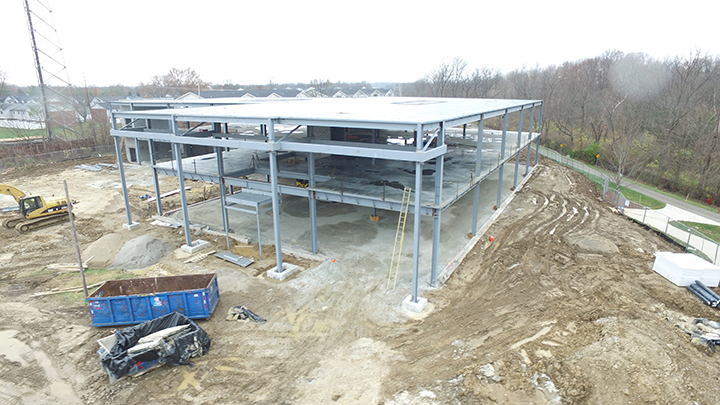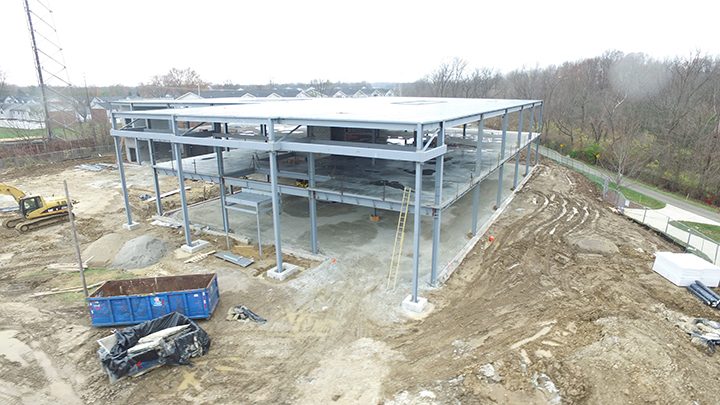
By Ann Marie Shambaugh

Zionsville officials are planning for some big changes in 2017, including the completion of a new Town Hall building, the implementation of a tax to fund public safety and several updates to aging infrastructure.
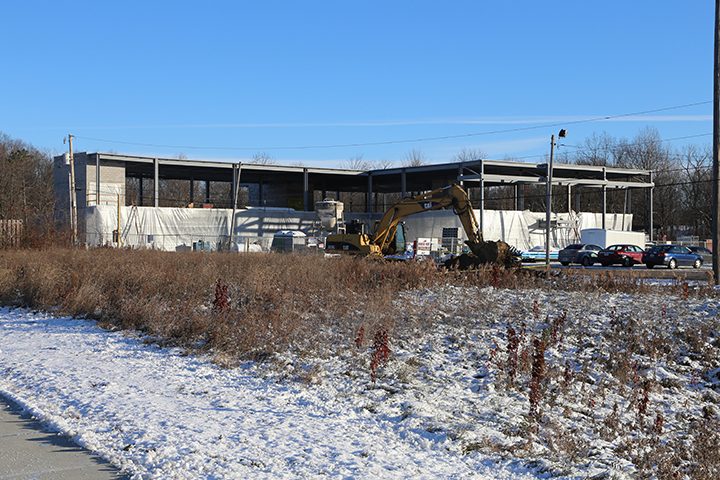
New Town Hall to open
Zionsville’s new Town Hall building is expected to be complete in September or October of 2017, and town employees can’t wait.
“We’ll be transitioning over there next fall as this building keeps falling apart,” Zionsville Mayor Tim Haak said from a conference room in the current Town Hall. “We look forward to it every day.”
The $10.2 million, 42,600-square-foot building is under construction behind the current one at 1100 W. Oak St. It will house the mayor’s office, fire administration and the planning, finance and technology departments and provide public meeting spaces, a community room and have an outdoor plaza that connects to the Rail Trail.
Once town officials move into their new space, the current Town Hall – which is in a 54-year-old former church – will be torn down to make way for new development. Haak said it will include a new road to align with Brendan Way.
Haak said the town will be “kind of picky” about what will be developed on the site and that they’ve had several inquiries.
“We would envision some potential mixed-use and probably some professional buildings, maybe doctors’ offices, dentists, eyecare,” Haak said. “We’ve got some people who have met with us and are getting a feel for what we like, and we think we’re going to have a couple proposals in the spring. We’re not in any rush right now.”
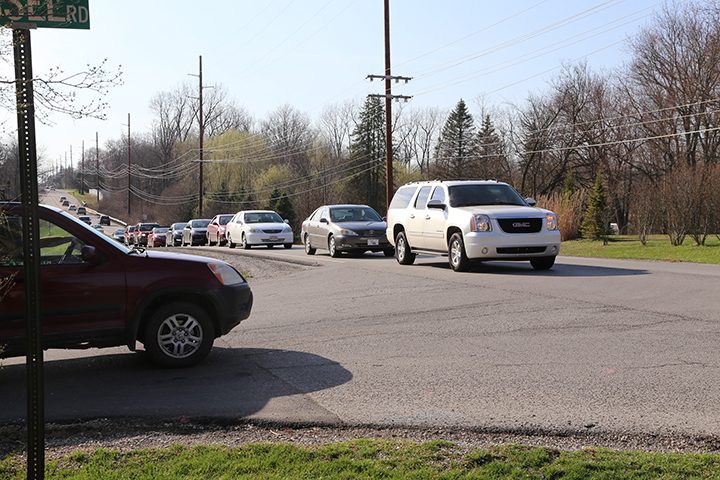
Town to focus on infrastructure
Improving infrastructure will be a focus for 2017, Haak said, with projects planned to address drainage issues, intersections, aging roads and more.
One of the first projects will be a stoplight installed at the intersection of Oak Street and Kissel Road, a project the town had hoped to complete by the end of 2016. Soil instability led to a delay, but town officials expect the project to be complete in early 2017.
The intersection, which many residents claimed to be dangerous in 2016, is planned to eventually be a double-lane roundabout, but the $1.6 million project is not yet funded.
One roundabout that will take shape in 2017 is at the intersection of Mulberry Street and Ford Road. The project is scheduled to occur during the summer months to provide as little disruption as possible to nearby schools.
Haak said residents can expect to see additional roundabouts in Zionsville, but not in 2017.
“There are some areas of town were roundabouts are great for traffic, but they’re not great for pedestrians. Especially in the Village, we want to keep the closeness of Main Street intact for walkers and shoppers,” he said. “Overall, we’ll see more roundabouts eventually.”
Village Walk Drive is among the town’s top priorities for repair. The town will spend $800,000 to completely replace the half-mile street next summer.
In March, construction is expected to begin at the intersection of 96th Street and Zionsville Road. Through lanes will be added north and south to Technology Drive, bike lanes and sidewalks will be added, the east/west alignment will be corrected and the traffic signal will be modernized. Construction is planned to wrap up by August.
Other infrastructure projects expected to begin in 2017 include bridge replacements by INDOT along I-865, upgrades to Zionsville Road between 96th and 106th streets, and improvements to the wastewater and stormwater systems in the Village, which are more than 100 years old.
The town also expects to construct a pathway along 700 E between the Royal Run subdivision and Zionsville West Middle School, a project that has been long delayed.
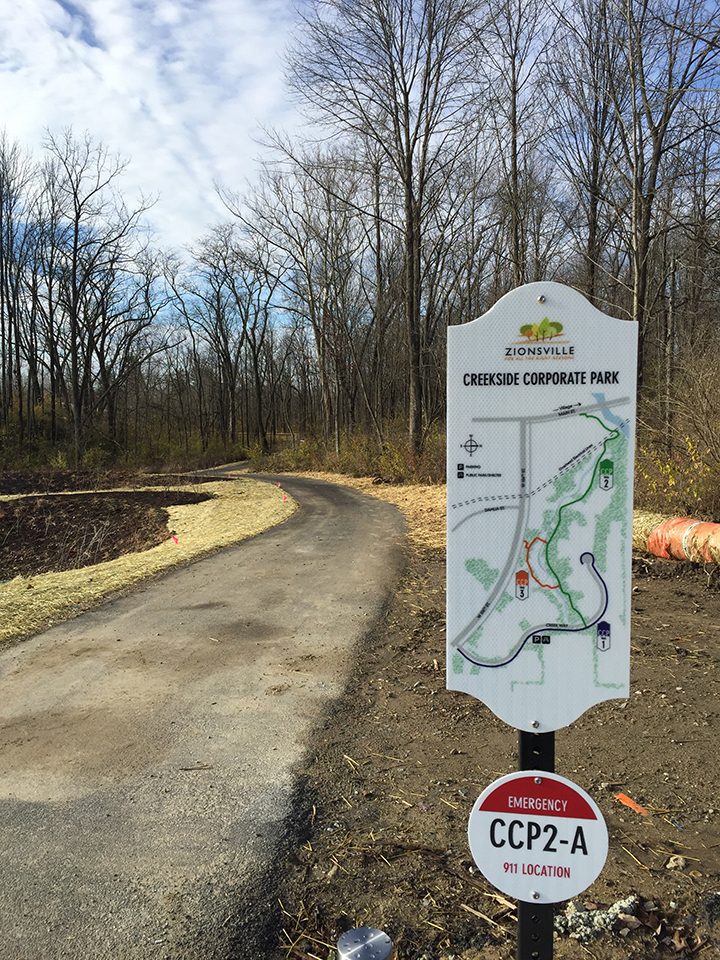
Creekside Corporate Park to welcome first tenants
Construction on Creekside Corporate Park is ongoing, with the first tenant – DK Pierce – planning to move in by late spring. Haak expects several more tenant announcements in 2017, but he’s not in a hurry.
“We’re not going to rush to put people in there as fast as we can,” he said. “We’re going to get the right ones in there for the long-term benefit of the town.”
The Town touts Creekside as a 66-acre “conservation” office park, as nearly 40 percent of the property will remain as natural woodlands. It will also include more than one mile of trails through the natural areas, which are expected to open to the public as soon as construction on boardwalk areas is complete.
“We’re creating something that a developer couldn’t. We’re putting more money into it than a developer would have the cabaility,” Haak said. “I think a developer would’ve gone in, cut all the trees down and flattened it, so we’re really trying to create something special in there. We take people back there and they go, ‘Oh, my goodness, this place is awesome.’”
Creekside is part of Zionsville’s ongoing efforts to expand its tax base, which took a big hit when residential property tax caps went into effect, Haak said.
“When tax caps were first implemented, we were about 95 percent residential, and it’s not a good business model for us to survive in,” he said. “Tax caps have been hard on bedroom communities like Zionsville, so we’ve had to find creative ways to expand that.”
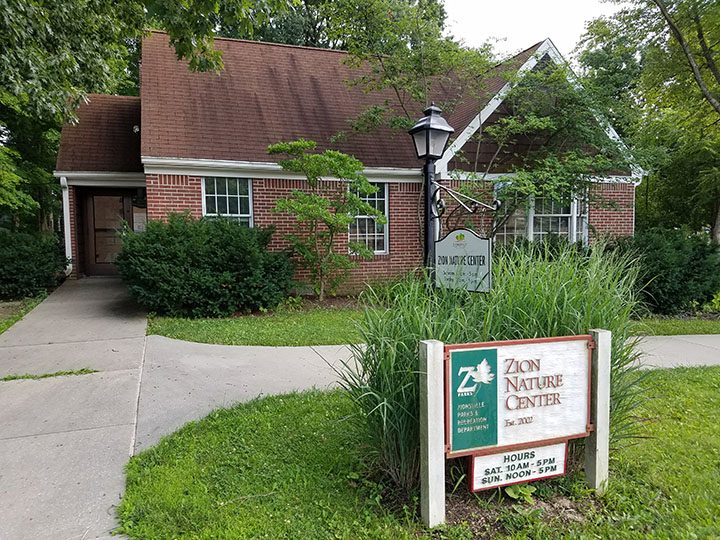
Zion Nature Center move uncertain
The Zion Nature Center will be moving into a new home, but town officials don’t know yet if it will happen in 2017.
Since opening in 2002, the nature center has operated out of a building owned by Zionsville Community Schools. The district has indicated it intends to use the site of the nature center for offices as growth has created a need for more space.
In 2015, the Zionsville Town Council approved $300,000 to build a new nature center near Heritage Trail Park. The proposed 5,000-square-foot building could also serve as a backup Town Hall, if needed. The project went out to bid in 2016, but when all bids came back much higher than expected, the town put the project on hold. Town officials are considering whether to re-bid the project when construction firms are less busy or make changes to the scope of the project.
In the meantime, the funds designated for the new nature center could be reallocated for projects that include installation of irrigation wells at Mulberry Fields and updating stairways along trails.
Public safety tax implemented
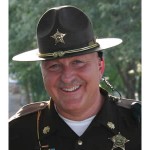
Beginning Jan. 1, a .5 percent local income tax for public safety will go into effect in Boone County. Proposed by Boone County Sheriff Mike Nielsen, the Zionsville Town Council was among six municipalities to vote in support of the new tax at a special meeting in October.
The LIT is expected to generate $4 million for the town in its first year. The Zionsville police and fire departments plan to begin hiring additional staff in 2017, as both have been operating below ideal staffing levels for many years.
The police department plans to hire three officers in 2017, two more and a civilian position in 2018 and two or three additional officers in 2019.
“That’s going to bring us up to the (suggested) standards of 2016,” ZPD Chief Robert Knox said. “Still, I’m operating two to three years behind, but with our crime, I don’t need an officer on every corner, and nobody wants that, including myself.”

ZFD plans to hire 12 new employees with LIT funds, with firefighters expected to be ready to begin working shifts in August or September. The department did not add any positions when it opened Station 93 in 2012 and has not since, leaving each fire truck staffed with three firefighters as opposed to the ideal total of four.
The LIT is expected to cost approximately $500 per year for a resident making $100,000 a year. In October, Zionsville Town Council President Susana Suarez said that the council intends to file an amendment in early 2017 that would sunset the tax in seven to 10 years, which would cause officials to review the tax and its effectiveness.
What to expect in 2017
Other changes to expect in 2017 include:
- Continued population growth in Zionsville. Several neighborhoods are expected to be under construction, with many new homes ready in 2017.
- An inaugural poetry contest, a joint effort between the Town of Zionsville and the Zionsville Cultural District. The winner is expected to have his or her poem inscribed in the plaza outside of the new Town Hall.
- The first Mayor’s Night In events, tentatively scheduled for March 1 and Nov. 1. The program at Town Hall is open to the public and will include comments from the mayor on timely issues and a chance for attendees to ask questions.
One year down

Mayor Tim Haak is confident heading into 2017, and for good reason. At this time last year, he was preparing to become the town’s first full-time elected mayor and didn’t know if it was a position that would last.
When the Indiana Supreme Court validated Zionsville’s reorganization with Perry Township in January, thereby solidifying the position of mayor, Haak found instant job security. Now, a year into his first term and more than a year after the reorganization, he feels the town is in a good place for positive growth.
“We’ve got a lot of positive momentum,” Haak said.
Haak’s first year was full of ups and downs. It included three murders in a town that hadn’t seen one since 1997; many new business announcements; and a vote to implement a new countywide tax. No matter what happened, Haak said the town’s new governmental structure helped officials handle situations more efficiently.
“Things happen a lot faster. That’s the primary reason the council decided to have a mayor instead of waiting every 30 days for a council to take action,” he said. “We can get stuff done in a matter of hours or days. The residents and the business community have someone to call with questions, concerns or complaints.”
Looking ahead, Haak is eager to implement his first budget and enter into a new year with some experience under his belt.
“(There’s) still a steep learning curve, but it’s a lot of fun,” he said.


